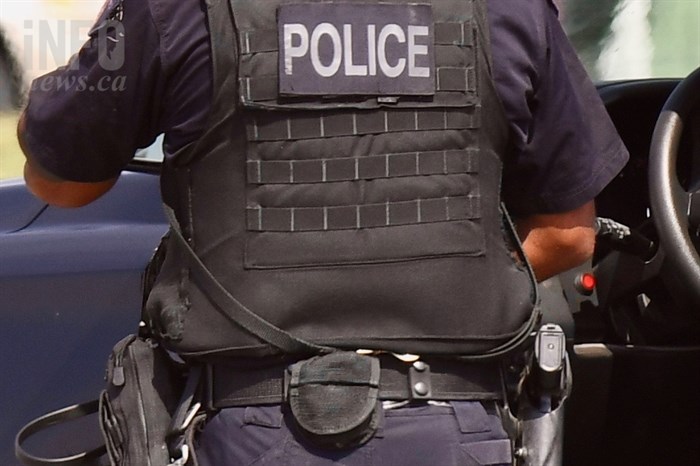
FILE PHOTO
(JOHN MCDONALD / iNFOnews.ca)
March 05, 2023 - 6:00 AM
Frontline RCMP officers throughout Canada are expected to start wearing body cameras as early as this fall.
“Nationally, folks are going to be here over the course of the summer,” Darren Caul, Kelowna’s community safety director, told city council earlier this week. “We have requested a memo from the RCMP with respect to the resource implications of introducing body worn cameras in our city. Obviously, it’s nationally driven, so I would suggest fall 2023 into early 2024 (for the roll out).”
The RCMP conducted a pilot project with the cameras in Iqaluit from Nov. 30, 2020 to May 31, 2021, and will launch field trials with about 300 officers in Alberta, Nova Scotia and Nunavut this spring.
“The RCMP can confirm that a contract was awarded to Motorola Solutions Canada Inc., in January 2023, for the provision of body worn cameras and a digital evidence management service,” RCMP Corp. Kim Chamberland said in an email to iNFOnews.ca.
“Should the contractor demonstrate the ability to meet all contractual requirements during field tests, they will be confirmed as the provider of body-worn cameras and the digital evidence management system for the RCMP, at which point the national rollout will begin. National roll-out will proceed in a phased approach and is expected to take 12 to 18 months. It is still too early to determine which RCMP detachments will be among the first to receive body worn cameras when the national roll-out begins.”
READ MORE: Kamloops property crime rises again
Caul’s point about the cost of the program is being echoed in other B.C. municipalities.
In January, the Vancouver Sun noted that Port Coquitlam city council said "they had enough and wouldn’t pay for elements” of the program, which is expected to cost that city of about 59,000 more than $218,000 over five years.
On Feb. 21, RCMP Sgt. Monty Taylor told Castlegar city council he had concerns about the increased workload created by the cameras, according to a Castlegar News report. Officers or clerks will have to review the footage and do things like manually removing licence plate numbers of vehicles passing a scene of a police incident.
The cameras are expected to cost up to $3,000 each.
The federal government allocated $238.5 million to the program in 2020 but according to the Vancouver Sun article, Craig Hodge, a Coquitlam city councillor and co-chairman of the Union of B.C. Municipalities’ local government-RCMP contract management committee, expressed concerns that that money is quickly running out.
READ MORE: Kelowna RCMP arresting the same 20 people every week
The initial pilot project in Iqaluit involved 53 police officers who used the cameras in 14% of the 5,421 police occurances they dealt with during the trial period. The videos averaged nine minutes in length and about 6% were redacted for use in court. Each of those took four minutes to redact, according to an RCMP review of the program.
Rules are still being developed around when and where the cameras will be activated.
At this point, they are to be turned on during calls for service for such things as mental health calls, interactions with people in crisis, crimes in progress, investigations, public disorder and protests.
They are not intended to be used for 24-hour recording, surveillance or during intimate searches.
“When possible, officers will let you know when the camera is recording,” an outline on the usage policy says. “The decision to turn on a body-worn camera will happen before the officer arrives at a call for service.”
Following the Iqaluit pilot project, 70 community members responded to a survey about the cameras.
There were 68.5% who said it increased their trust in the police, 77.2% said it helped the police to be more transparent and 61.5% said it increased public safety.
Police officers were also surveyed and 85% supported the use of the cameras but most said they did not notice any change in their behaviour towards the public during the pilot project.
The goal of the program, which will see 10,000 to 15,000 cameras distributed across the country, is for more timely resolution of complaints, improved evidence gathering, enhanced transparency and accountability for police and improved police and public behaviour, the RCMP says.
The operational policy can be seen here.
To contact a reporter for this story, email Rob Munro or call 250-808-0143 or email the editor. You can also submit photos, videos or news tips to the newsroom and be entered to win a monthly prize draw.
We welcome your comments and opinions on our stories but play nice. We won't censor or delete comments unless they contain off-topic statements or links, unnecessary vulgarity, false facts, spam or obviously fake profiles. If you have any concerns about what you see in comments, email the editor in the link above.
News from © iNFOnews, 2023